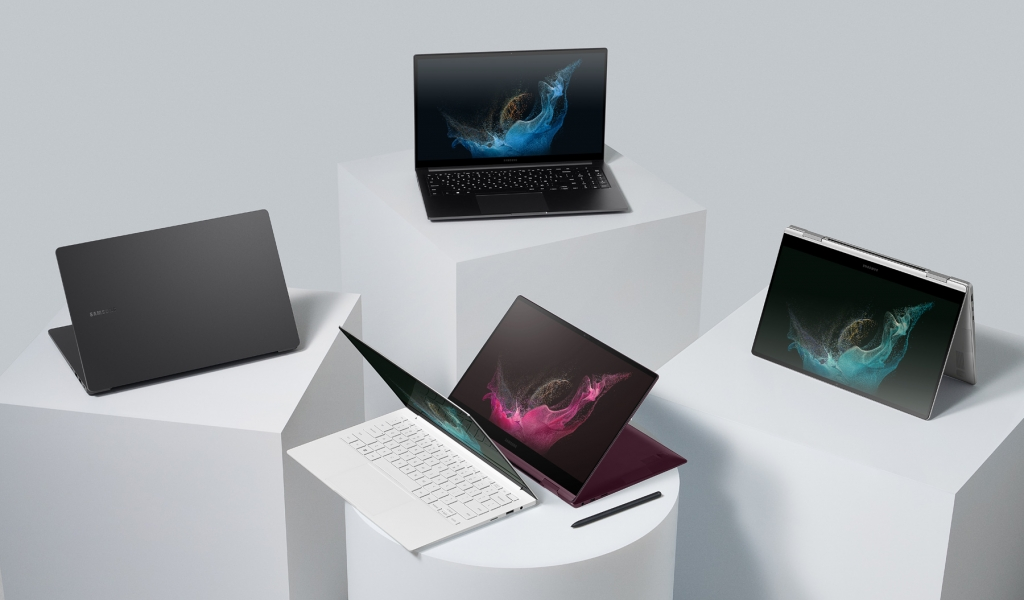 APPS
APPS
 APPS
APPS
 APPS
APPS
Samsung Electronics Co. Ltd. today introduced a new line of Windows laptops, the Galaxy Book2 series, that features Intel Corp.’s latest silicon and a blockchain-based file sharing tool.
The Galaxy Book2 series comprises four devices. Three are aimed at the consumer market, while the fourth is designed for the enterprise.
The two flagship consumer laptops in the series are the Galaxy Book 2 Pro and the Galaxy Book 2 Pro 360. The former machine offers 5G support, while the latter features a convertible design that allows it to be used as a tablet.
The Galaxy Book 2 Pro and the Galaxy Book 2 Pro 360 can be ordered with either 13.3-inch or a 15.6-inch display. Both devices’ screens are based on Samsung’s FHD AMOLED display technology.
In a traditional LCD display, the pixels don’t generate their own light but rather offload the task to a separate component called a backlight. In contrast, the pixels of an FHD AMOLED screen generate their own light using an electroluminescent material that activates when electricity runs through it.
FHD AMOLED screens arrange pixels in a so-called active matrix configuration. Each pixel is managed by at least one transistor that helps optimize power usage and also prevent the pixel’s electrical charge from interfering with nearby pixels.
Both the Galaxy Book 2 Pro and Galaxy Book 2 Pro 360 are powered by a central processing unit from Intel Corp.’s newest 12th Gen Intel Core processor line, also known as Alder Lake. The processor line is based on Intel’s newest 10-nanometer manufacturing process.
Every Alder Lake chip includes two sets of processing cores. There are performance cores designed to optimize the speed of hardware-intensive applications, as well as efficiency cores that can run less hardware-intensive applications using a fraction of the electricity. The performance cores are about 19% faster than Intel’s previous-generation Cypress Cove architecture when operating at the same frequency, the chipmaker says.
Alongside hardware improvements, the Galaxy Book 2 line introduces new software. A new application called Samsung Device Care highlights ways that users can optimize their laptops’ power usage and storage capacity. Also new: a feature that, according to Samsung, makes it possible to share business documents through “timed links with increased security options based on blockchain technology.”
The Galaxy Book 2 Pro and Galaxy Book 2 Pro 360 can be configured with a Core i3, Core i5 or Core i7 processor from Intel’s Alder Lake chip line. The former device ships with up to 32 gigabytes of memory and 1 terabyte of storage space, while the latter supports up to 15 gigabytes of memory and 512 gigabytes of storage space. The laptops will be available starting from $1,050 and $1,250, respectively.
Samsung is rolling out the two devices alongside the more accessible Galaxy Book 2 360, an updated version of the previous-generation Galaxy Book that can be turned into a tablet. It features a 12-inch display and will be available from $900.
The fourth device in the laptop series is the Galaxy Book2 Business. It’s a version of the Galaxy Book 2 Pro with additional software features aimed at the enterprise market.
The Galaxy Book2 Business supports Intel’s vPro technology, a suite of software tools that make it easier for information technology teams to secure employee devices and troubleshoot technical issues. The laptop also includes a feature called Tamper Alert. According to Samsung, the feature detects hacking attempts and can block malware from modifying a device’s operating system.
Support our mission to keep content open and free by engaging with theCUBE community. Join theCUBE’s Alumni Trust Network, where technology leaders connect, share intelligence and create opportunities.
Founded by tech visionaries John Furrier and Dave Vellante, SiliconANGLE Media has built a dynamic ecosystem of industry-leading digital media brands that reach 15+ million elite tech professionals. Our new proprietary theCUBE AI Video Cloud is breaking ground in audience interaction, leveraging theCUBEai.com neural network to help technology companies make data-driven decisions and stay at the forefront of industry conversations.